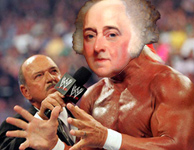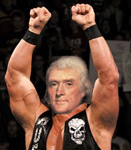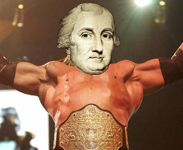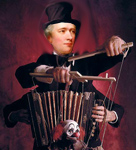Election 1800: A Second Revolution
John Adams and Thomas Jefferson had been close friends, kindred spirits since the First Continental Congress. While serving as diplomats in France, their friendship became akin to kinship. While serving in Washington's administration, their philosophical differences tore them apart. That fight turned into opposing political parties: Federalists and Democratic-Republicans.
The Contenders:
Quick rules lesson: Back then electors voted for two men, one of which had to be from a different state. The winner was president, runner-up vice president. That's why each party chose two candidates, and that's why each party chose a Northerner and a Southerner. That's also why in 1796 the president and vice president were from different parties.
 President John Adams (Federalist-MA) - Having grown up among the working men, he believed they could not be trusted with the important decisions, even who got to be president. As president, he ignored public opinion and refused to get involved in the French Revolution. To quell opposition, he passed the Alien and Sedition Acts, which allowed him to deport protesters and jail anyone who spoke out or wrote against him.
President John Adams (Federalist-MA) - Having grown up among the working men, he believed they could not be trusted with the important decisions, even who got to be president. As president, he ignored public opinion and refused to get involved in the French Revolution. To quell opposition, he passed the Alien and Sedition Acts, which allowed him to deport protesters and jail anyone who spoke out or wrote against him.
 Vice President Thomas Jefferson (Democratic-Republican-VA) - Having grown up among the uber-rich, he believed the aristocracy couldn't be trusted to act in the best interest of the people. He saw the Adams presidency as a symbol of that distrust. The Federalist party, he thought, would re-form the government into the very monarchy we had just fought to remove.
Vice President Thomas Jefferson (Democratic-Republican-VA) - Having grown up among the uber-rich, he believed the aristocracy couldn't be trusted to act in the best interest of the people. He saw the Adams presidency as a symbol of that distrust. The Federalist party, he thought, would re-form the government into the very monarchy we had just fought to remove.
 Former Senator Aaron Burr (Democratic-Republican-NJ) - Having grown up in chaos, served in the Revolutionary War in chaos, and wallowed in financial chaos, he sought escape in politics. His only real political philosophy was that he deserved to be in power, and nothing should stand in the way of that.
Former Senator Aaron Burr (Democratic-Republican-NJ) - Having grown up in chaos, served in the Revolutionary War in chaos, and wallowed in financial chaos, he sought escape in politics. His only real political philosophy was that he deserved to be in power, and nothing should stand in the way of that.
 Former Minister to France Charles Cotesworth "C.C." Pinckney (Federalist-SC) - Just think of him as the Federalist who isn't John Adams.
Former Minister to France Charles Cotesworth "C.C." Pinckney (Federalist-SC) - Just think of him as the Federalist who isn't John Adams.
 Former Treasury Secretary Alexander Hamilton (Federalist, Nevis) - The story would not be complete without mentioning Alexander Hamilton. Born on the island of Nevis, Hamilton could never be president, but he used his position as Washington's trusted advisor to take over the first president's policy direction. When Adams won in 1796, Hamilton filled his cabinet with Hamiltonian loyalists who reported to their leader before the president. Alexander Hamilton enjoyed absolute control until late 1800 when Adams finally grew a pair and fired the Hamiltonians from his cabinet.
Former Treasury Secretary Alexander Hamilton (Federalist, Nevis) - The story would not be complete without mentioning Alexander Hamilton. Born on the island of Nevis, Hamilton could never be president, but he used his position as Washington's trusted advisor to take over the first president's policy direction. When Adams won in 1796, Hamilton filled his cabinet with Hamiltonian loyalists who reported to their leader before the president. Alexander Hamilton enjoyed absolute control until late 1800 when Adams finally grew a pair and fired the Hamiltonians from his cabinet.
The Fight:
Federalist newspapers ripped Jefferson apart, while the Sedition Act stopped Republican papers from doing the same to Adams. In response, the Republicans built their party like never before. In early 1800, they won the majority of the staunchly Federalist New York legislature, and their electoral votes.
Hamilton, in a last ditch effort to get his way, wrote a 54-page missive publicly ripping Adams a new asshole, in hopes Federalist electors would move toward Pinckney. On election day, Federalist votes were all over the place. The win in New York tipped the election to the Republicans for the first time in history. Jefferson and Burr tied with 73 electoral votes.
The tie went to the House of Representatives.For 33 ballots, they deadlocked as back rooms filled with Congressmen making deal after deal. Hamilton, who had long supported Jefferson over Burr as the lesser of two evils, finally got to one of those Representatives, and on the 34th ballot Jefferson won. Finally.
The Title:
In his inaugural address, Jefferson called his victory "a Second Revolution." The people didn't like the direction the government was going, so they went in a different direction and proved democracy could work. He won re-election in 1804.
After Hamilton stopped Burr from winning the New York governorship, Burr shot Hamilton and disappeared into the West, where he died at a ripe old, crazy age.
Pinckney became the go-to Federalist candidate for a few more elections.
Adams had trouble getting over losing to a man clearly more liked than himself. Eventually, he and Jefferson reconciled and corresponded over 150 times during the last 14 years of their lives. They both died July 4, 1826, the fiftieth anniversary of the Declaration of Independence.
Next Up - Election 1824: Enter Andrew Jackson
The Contenders:
Quick rules lesson: Back then electors voted for two men, one of which had to be from a different state. The winner was president, runner-up vice president. That's why each party chose two candidates, and that's why each party chose a Northerner and a Southerner. That's also why in 1796 the president and vice president were from different parties.
 President John Adams (Federalist-MA) - Having grown up among the working men, he believed they could not be trusted with the important decisions, even who got to be president. As president, he ignored public opinion and refused to get involved in the French Revolution. To quell opposition, he passed the Alien and Sedition Acts, which allowed him to deport protesters and jail anyone who spoke out or wrote against him.
President John Adams (Federalist-MA) - Having grown up among the working men, he believed they could not be trusted with the important decisions, even who got to be president. As president, he ignored public opinion and refused to get involved in the French Revolution. To quell opposition, he passed the Alien and Sedition Acts, which allowed him to deport protesters and jail anyone who spoke out or wrote against him. Vice President Thomas Jefferson (Democratic-Republican-VA) - Having grown up among the uber-rich, he believed the aristocracy couldn't be trusted to act in the best interest of the people. He saw the Adams presidency as a symbol of that distrust. The Federalist party, he thought, would re-form the government into the very monarchy we had just fought to remove.
Vice President Thomas Jefferson (Democratic-Republican-VA) - Having grown up among the uber-rich, he believed the aristocracy couldn't be trusted to act in the best interest of the people. He saw the Adams presidency as a symbol of that distrust. The Federalist party, he thought, would re-form the government into the very monarchy we had just fought to remove. Former Senator Aaron Burr (Democratic-Republican-NJ) - Having grown up in chaos, served in the Revolutionary War in chaos, and wallowed in financial chaos, he sought escape in politics. His only real political philosophy was that he deserved to be in power, and nothing should stand in the way of that.
Former Senator Aaron Burr (Democratic-Republican-NJ) - Having grown up in chaos, served in the Revolutionary War in chaos, and wallowed in financial chaos, he sought escape in politics. His only real political philosophy was that he deserved to be in power, and nothing should stand in the way of that. Former Minister to France Charles Cotesworth "C.C." Pinckney (Federalist-SC) - Just think of him as the Federalist who isn't John Adams.
Former Minister to France Charles Cotesworth "C.C." Pinckney (Federalist-SC) - Just think of him as the Federalist who isn't John Adams. Former Treasury Secretary Alexander Hamilton (Federalist, Nevis) - The story would not be complete without mentioning Alexander Hamilton. Born on the island of Nevis, Hamilton could never be president, but he used his position as Washington's trusted advisor to take over the first president's policy direction. When Adams won in 1796, Hamilton filled his cabinet with Hamiltonian loyalists who reported to their leader before the president. Alexander Hamilton enjoyed absolute control until late 1800 when Adams finally grew a pair and fired the Hamiltonians from his cabinet.
Former Treasury Secretary Alexander Hamilton (Federalist, Nevis) - The story would not be complete without mentioning Alexander Hamilton. Born on the island of Nevis, Hamilton could never be president, but he used his position as Washington's trusted advisor to take over the first president's policy direction. When Adams won in 1796, Hamilton filled his cabinet with Hamiltonian loyalists who reported to their leader before the president. Alexander Hamilton enjoyed absolute control until late 1800 when Adams finally grew a pair and fired the Hamiltonians from his cabinet.The Fight:
Federalist newspapers ripped Jefferson apart, while the Sedition Act stopped Republican papers from doing the same to Adams. In response, the Republicans built their party like never before. In early 1800, they won the majority of the staunchly Federalist New York legislature, and their electoral votes.
Hamilton, in a last ditch effort to get his way, wrote a 54-page missive publicly ripping Adams a new asshole, in hopes Federalist electors would move toward Pinckney. On election day, Federalist votes were all over the place. The win in New York tipped the election to the Republicans for the first time in history. Jefferson and Burr tied with 73 electoral votes.
The tie went to the House of Representatives.For 33 ballots, they deadlocked as back rooms filled with Congressmen making deal after deal. Hamilton, who had long supported Jefferson over Burr as the lesser of two evils, finally got to one of those Representatives, and on the 34th ballot Jefferson won. Finally.
The Title:
In his inaugural address, Jefferson called his victory "a Second Revolution." The people didn't like the direction the government was going, so they went in a different direction and proved democracy could work. He won re-election in 1804.
After Hamilton stopped Burr from winning the New York governorship, Burr shot Hamilton and disappeared into the West, where he died at a ripe old, crazy age.
Pinckney became the go-to Federalist candidate for a few more elections.
Adams had trouble getting over losing to a man clearly more liked than himself. Eventually, he and Jefferson reconciled and corresponded over 150 times during the last 14 years of their lives. They both died July 4, 1826, the fiftieth anniversary of the Declaration of Independence.
Next Up - Election 1824: Enter Andrew Jackson
Labels: elections, presidents





 This blog is not to be taken seriously. Seriously. I take this seriously, but you shouldn't. You should do what you want, but you'll probably enjoy this more if you don't take anything I say seriously. I mean, I mean what I say, but it's not serious. Oh also, swearing is hilarious. It shouldn't be, but it is.
This blog is not to be taken seriously. Seriously. I take this seriously, but you shouldn't. You should do what you want, but you'll probably enjoy this more if you don't take anything I say seriously. I mean, I mean what I say, but it's not serious. Oh also, swearing is hilarious. It shouldn't be, but it is.


0 Comments:
Post a Comment
Subscribe to Post Comments [Atom]
<< Home